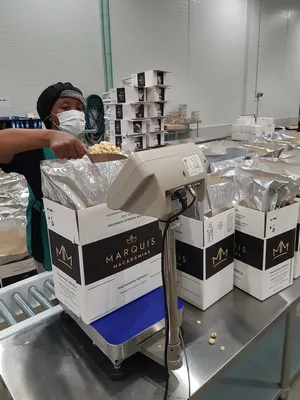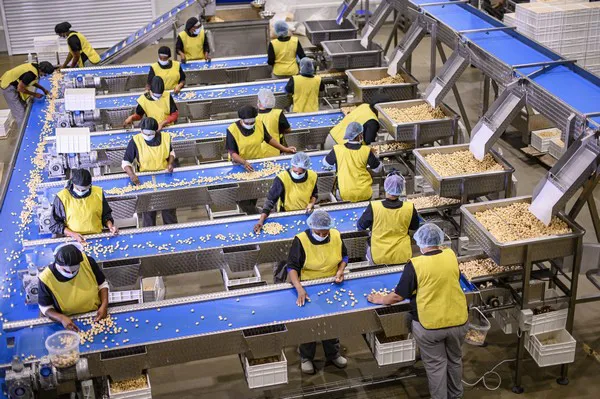The South African macadamia harvest starts around February and lasts until September, the country 72,652 hectares in production.
Weather has for the most part been favourable and South Africa has delivered another bumper crop. The total yield has surpassed last year's 68840 (2022 actual) tons to reach 81 556 (2023 forecast) tons.
"The growth is due to more trees coming into production. Quality overall has been average, with a few incidences of higher insect damage. In general, the crop looks good," according to Roelof van Rooyen, director of Marquis Macadamias.
 The South African crop is mostly harvested manually, as opposed to mechanically. Mature nuts drop to the ground and are then collected by hand or machine. Certain varieties require an Ethepon spray application to force the nuts to dislodge from the branches and fall to the ground so that they can be collected.
The South African crop is mostly harvested manually, as opposed to mechanically. Mature nuts drop to the ground and are then collected by hand or machine. Certain varieties require an Ethepon spray application to force the nuts to dislodge from the branches and fall to the ground so that they can be collected.
Marquis Macadamias processes nuts to nut-in-shell, and kernel which is sold to customers who then value add. Marquis Macadamias does however have facilities in Australia that roasts and coats nuts for sale under the Marquis brand and to external clients. Our main export markets are the EU, UK, US and China.
"Demand has subdued from previous years due to the global economic crisis and Covid hangover. Macadamias are a luxury product and unfortunately have suffered under the reduced global spending power. At the same time, the global crop is increasing making supply and demand trends unfavourable to macadamia farmers," said
"However, with the increased supply, the macadamia industry will now be able to expand fully into the food ingredient sector, since the lower price makes it more attractive to include in nut bars, confectionary and cereals. Prices have reached a ten year low globally, but have stabilised. Demand is picking up for both kernel and nut-in-shell but it will be some time before the market recovers completely. The change in market conditions requires new marketing strategies and innovation. This is where the experience and expertise of Marquis Marketing, the marketing branch of Marquis Macadamias plays a pivotal role. In this market, it is prudent that the right partnerships and relationships are built that will ensure stability and sustainability for all role players. Both farmers and processors have made substantial investments over the last few years and it is crucial that the industry continues to deliver good returns for producers, while still stimulating market demand."

Only around 2% of the macadamias produced in South Africa are typically sold and consumed in South Africa, since the export market has always held better value, and South Africa's relatively small affluent population means that demand has been low.
"The lower prices are however seeing demand for macadamias pick up locally. The increase in marketing efforts are also starting to pay off as more people become aware of macadamias. Health research proving the benefits of macadamias is also set to boost demand in years to come, as will the plant-based protein movement." For more information:
For more information:
Lindi Bothma
Marquis Macadamia
[email protected]
marquis.com
